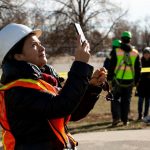Four Things We Appreciate Now More Than Ever
1. Health Care
2. Teachers
3. The Arts (music, movies, etc.)
4. Walking and Biking Safely in the Street
Speaking of walking and biking safely…Right now, many communities throughout the world have begun to open sections of their street network for car-free transportation and recreation. Little by little, residents are starting to see and feel what it is like to safely place to stroll and play in public spaces. What kind of conditioning have we experienced that creates our filter for how to prioritize streets?
Do you know that “jaywalking” is a term that was created by the auto industry? That’s right. Prior to about 1915, streets were vibrant public spaces where people strolled and children played. But in order for automobile makers to sell more cars, they had to clear the streets of people so cars could move more freely. So they coined the term “jaywalker” (jay was a derogatory term), which they planted in newspapers and made an official crime. The auto industry villainized any human who had the gaul to walk in the street – something people had always done. This is one of my favorite videos about it – it’s short and well-researched:
So… why is this relevant? Well, these days, hardly anyone is driving. Most people are not working and are also eliminating all non-essential travel. In fact, research shows that vehicle miles traveled has decreased in the US: 50% overall and 80% in many major US cities. (Check out your county here) And yet… people who are walking (and sometimes wheeling) are still largely relegated to the sidewalks. Why? Because we have been socially conditioned that it is unsafe and illegal to walk in the streets – no matter what. What experiences will we learn from during this pandemic? What will we yearn for during this pandemic?
We propose:
Let’s all use these public spaces in hopes that it will inspire more corridors to be opened and more communities to follow suit. And may it pave the way for more conversations about how people-centric street design and equity-focused policy can support public health goals during the coronavirus emergency and beyond.


